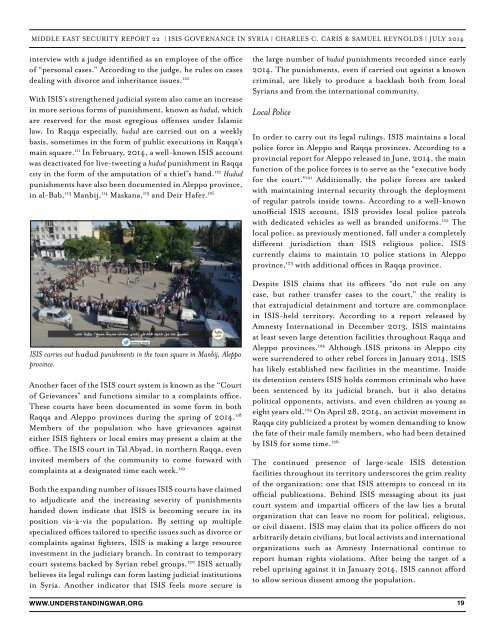ISIS_Governance
ISIS_Governance
ISIS_Governance
Create successful ePaper yourself
Turn your PDF publications into a flip-book with our unique Google optimized e-Paper software.
Middle East Security Report 22 | <strong>ISIS</strong> <strong>Governance</strong> in syria | Charles C. Caris & Samuel Reynolds | july 2014<br />
interview with a judge identified as an employee of the office<br />
of “personal cases.” According to the judge, he rules on cases<br />
dealing with divorce and inheritance issues. 110<br />
With <strong>ISIS</strong>’s strengthened judicial system also came an increase<br />
in more serious forms of punishment, known as hudud, which<br />
are reserved for the most egregious offenses under Islamic<br />
law. In Raqqa especially, hudud are carried out on a weekly<br />
basis, sometimes in the form of public executions in Raqqa’s<br />
main square. 111 In February, 2014, a well-known <strong>ISIS</strong> account<br />
was deactivated for live-tweeting a hudud punishment in Raqqa<br />
city in the form of the amputation of a thief’s hand. 112 Hudud<br />
punishments have also been documented in Aleppo province,<br />
in al-Bab, 113 Manbij, 114 Maskana, 115 and Deir Hafer. 116<br />
<strong>ISIS</strong> carries out hudud punishments in the town square in Manbij, Aleppo<br />
province.<br />
Another facet of the <strong>ISIS</strong> court system is known as the “Court<br />
of Grievances” and functions similar to a complaints office.<br />
These courts have been documented in some form in both<br />
Raqqa and Aleppo provinces during the spring of 2014. 118<br />
Members of the population who have grievances against<br />
either <strong>ISIS</strong> fighters or local emirs may present a claim at the<br />
office. The <strong>ISIS</strong> court in Tal Abyad, in northern Raqqa, even<br />
invited members of the community to come forward with<br />
complaints at a designated time each week. 119<br />
Both the expanding number of issues <strong>ISIS</strong> courts have claimed<br />
to adjudicate and the increasing severity of punishments<br />
handed down indicate that <strong>ISIS</strong> is becoming secure in its<br />
position vis-à-vis the population. By setting up multiple<br />
specialized offices tailored to specific issues such as divorce or<br />
complaints against fighters, <strong>ISIS</strong> is making a large resource<br />
investment in the judiciary branch. In contrast to temporary<br />
court systems backed by Syrian rebel groups, 120 <strong>ISIS</strong> actually<br />
believes its legal rulings can form lasting judicial institutions<br />
in Syria. Another indicator that <strong>ISIS</strong> feels more secure is<br />
www.Understandingwar.org<br />
the large number of hudud punishments recorded since early<br />
2014. The punishments, even if carried out against a known<br />
criminal, are likely to produce a backlash both from local<br />
Syrians and from the international community.<br />
Local Police<br />
In order to carry out its legal rulings, <strong>ISIS</strong> maintains a local<br />
police force in Aleppo and Raqqa provinces. According to a<br />
provincial report for Aleppo released in June, 2014, the main<br />
function of the police forces is to serve as the “executive body<br />
for the court.” 121 Additionally, the police forces are tasked<br />
with maintaining internal security through the deployment<br />
of regular patrols inside towns. According to a well-known<br />
unofficial <strong>ISIS</strong> account, <strong>ISIS</strong> provides local police patrols<br />
with dedicated vehicles as well as branded uniforms. 122 The<br />
local police, as previously mentioned, fall under a completely<br />
different jurisdiction than <strong>ISIS</strong> religious police. <strong>ISIS</strong><br />
currently claims to maintain 10 police stations in Aleppo<br />
province, 123 with additional offices in Raqqa province.<br />
Despite <strong>ISIS</strong> claims that its officers “do not rule on any<br />
case, but rather transfer cases to the court,” the reality is<br />
that extrajudicial detainment and torture are commonplace<br />
in <strong>ISIS</strong>-held territory. According to a report released by<br />
Amnesty International in December 2013, <strong>ISIS</strong> maintains<br />
at least seven large detention facilities throughout Raqqa and<br />
Aleppo provinces. 124 Although <strong>ISIS</strong> prisons in Aleppo city<br />
were surrendered to other rebel forces in January 2014, <strong>ISIS</strong><br />
has likely established new facilities in the meantime. Inside<br />
its detention centers <strong>ISIS</strong> holds common criminals who have<br />
been sentenced by its judicial branch, but it also detains<br />
political opponents, activists, and even children as young as<br />
eight years old. 125 On April 28, 2014, an activist movement in<br />
Raqqa city publicized a protest by women demanding to know<br />
the fate of their male family members, who had been detained<br />
by <strong>ISIS</strong> for some time. 126<br />
The continued presence of large-scale <strong>ISIS</strong> detention<br />
facilities throughout its territory underscores the grim reality<br />
of the organization; one that <strong>ISIS</strong> attempts to conceal in its<br />
official publications. Behind <strong>ISIS</strong> messaging about its just<br />
court system and impartial officers of the law lies a brutal<br />
organization that can leave no room for political, religious,<br />
or civil dissent. <strong>ISIS</strong> may claim that its police officers do not<br />
arbitrarily detain civilians, but local activists and international<br />
organizations such as Amnesty International continue to<br />
report human rights violations. After being the target of a<br />
rebel uprising against it in January 2014, <strong>ISIS</strong> cannot afford<br />
to allow serious dissent among the population.<br />
19


